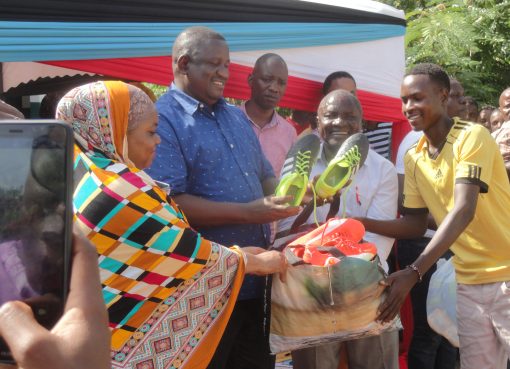The Ministry of Health and AstraZeneca, a multinational pharmaceutical and Biotechnology Company have donated a cutting edge, fast, non-invasive digital research equipment that uses retinal cameras to analyze the risk of a patient having or developing hypertension and diabetes through a single screening.
The event which was held under the theme ‘partnership for improved access to healthcare’ witnessed a handover of the equipment to research institutions including Kenya Medical Research Institute (KEMRI), Kenyatta National Hospital (KNH), The University of Nairobi (UoN) and the Aga Khan University Hospital (AKUHN).
The equipment is aimed at strengthening the local research capacity for Non-Communicable Diseases (NCDs), which accounts for 39 percent of deaths in the country.
The digital retinal imaging equipment scans an individual’s retina and the image is then processed through an online database stored in a cloud and compared to millions of other retinal scans by machine.
Speaking at the event in a Nairobi Hotel, Health Chief Administrative Secretary (CAS) Dr. Rashid Abdi Aman expressed his gratitude to AstraZeneca for their commitment in ensuring ease of access to affordable and sustainable healthcare.
The CAS stated that the donation was timely since the Ministry of Health is currently intent on cementing its global, national and regional policies on leveraging technology, innovation and ICT, access to affordable, effective, quality medicines and diagnostics and other technologies in the prevention and control of NCDs.
“Successful health care delivery requires effective medical devices as tools for prevention, diagnosis, treatment and rehabilitation. The use and evaluation of this digital camera to predict from the state of the retina the medical changes associated with diabetes and hypertension will identify patients early in the course of their diseases before the same advance to other stages that are difficult and expensive to control,” said Aman.
Vice President (VP) Sustainability, Access to Healthcare and Healthy Heart Africa at AstraZeneca Ashling Mulvaney stated that AstraZeneca is continuously leveraging science to strengthen the resilience and sustainability of healthcare systems.
“We are glad to support this donation because it will potentially contribute to the future of non-evasive screening for NCDs by empowering the recipient research institutions here in Kenya,” said Mulvaney.
Mulvaney added that the project demonstrated the importance of innovative public-private partnerships by contributing to the Ministry of Health’s mission and National NCD strategic plan that seeks to stop and reverse the growing burden of NCDs and ensuring that every Kenyan receives the highest attainable standard of NCD care in a sustainable, accessible and affordable manner.
Speakers from the county government, healthcare and research institutions and the private sector highlighted the need to strengthen the health care systems by encouraging local research and innovations.
Ampath Care Executive Director Prof Sylvester Kimayo, stated that there was need for everyone from the government, the private sector and citizens to join hands in the war against NCDs.
“The citizens should be educated on the risk factors that can lead to NCDs which include harmful use of alcohol, tobacco use, unhealthy eating habits and lack of physical activity,” stated Kimayo.
By Wambui Muthoni





